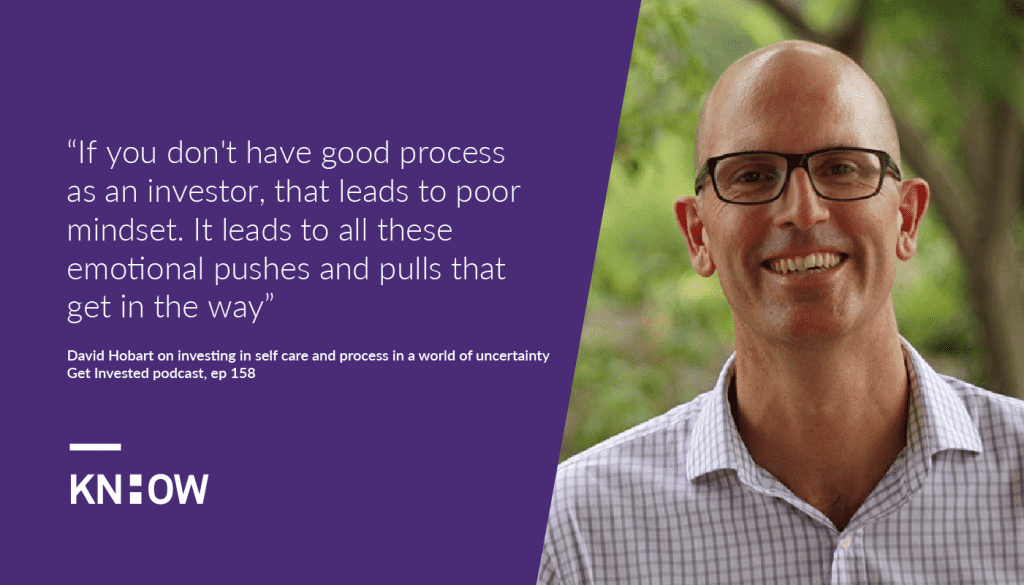David Hobart says sticking to your own process will ensure good risk management and increased savings, especially in times of uncertainty and volatility.
Many of the worst investment decisions are fuelled by emotional reactions and behaviours. That’s why the performance coach says you need to invest in your own process, especially when the market is volatile.
David has a specialist background in investing management, and has been coaching executives, professionals, traders and investors since 2006.
He talked to KnowHow founder Bushy Martin on the Get Invested podcast about some of the biggest barriers his coaching clients have faced.
“What I’ve experienced is people coming to me and saying ‘I’m tripping over myself all the time, I’m making poor decisions and then greed and fear gets in the way’ etc. So you have all these emotional issues getting in the road of their decision making,” he said.
“I say to them (we’ll) help you to find an emotional base rate for you to be more objective and to learn more about how you respond in certain circumstances and how it is that your past is actually impacting present decisions and emotional experiences. A base like that is important.
“But actually, if you don’t have a good process as an investor, that leads to poor mindset. It leads to all these emotional pushes and pulls that get in the way, and it’s just the emotion that’s causing you all the grief. I would say eight times out of ten, it’s poor process that leads to poor emotional outcome.
“I think the grounding in having tools at your disposal from an emotional regulation perspective is massively important. But it’s like 20 perspective of the deal. You’ve really got to have a great understanding of your own process, what you know, what you are good at, what’s the age that you’re bringing, what anomaly you’re trying to exploit, and have rigour around that and do the work around that. And that’s going to really make a big difference to your psychology.”
David said investing in your process will allow for better risk management in the market and ensure you’re prepared for future fluctuations.
“You can have good risk management strategies, which will save you a lot of money. So focus on risk if you’re engaging in markets for the first time,” he said.
“To think that the current environment will go on forever unimpeded is an unrealistic assumption. So how do you manage the biggest consequential risks that can take you out of the game? You’d have to think rates or inflation or something like that. How do you price those risks, what’s the probability assigned to them?
“I suppose I would just look at where we are in the interest rate cycle – that’s probably the most important thing at the minute. So go, ok, well, how would your current set up handle rates going up to 5%?”
David also emphasised that a part of your process should be investing in what you know and frequently evaluating your portfolio.
“What I’d be investing in right now is what you are good at and where you have a competitive edge. So invest in yourself and see if there’s a way that you can generate an income off that.
“You need to understand enough about your strategy … how am I enhancing my yield? How am I decreasing my vacancy rates? How is my leverage? How much wiggle room do I have if i go for a contingency? It’s about really understanding what are the levers to your investment performance and really honing in on and tightening and just becoming really focussed and know what you’re good at.
“And [for example] with selling your investment property to buy something like crypto, in my own experience, I make sure that I don’t get into a position where I have to sell property because it generates an income. And I think there’s something to be said for not necessarily falling for the latest shiny thing and getting out of something that you understand and that you’re familiar with and generates your yield.”
However, if you’ve strayed from your process in recent times and your investments have taken a downfall, David encouraged to practice self-care and look after your wellbeing.
“I’m pretty big on my self-care process and the notion of self-compassion. [My dad] would say to me don’t beat yourself up, because there’s no shortage of people in the world that’ll do that for you. And that quote has got me out of trouble so many times when I’m in this cycle of self-loathing after making a poor decision.”
Listen to the full interview here.
Want to Know How you can build wealth with the help of leading, qualified experts? Talk to the team at KnowHow, now.




